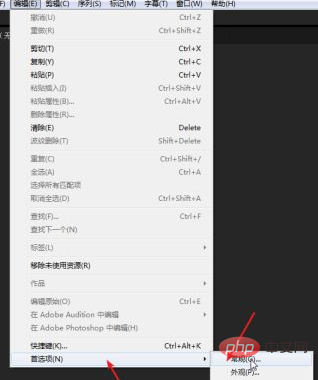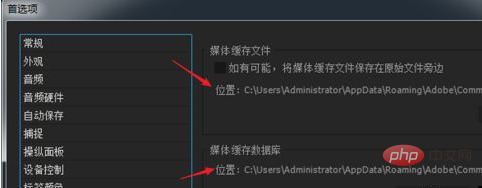How to delete C drive cache in PR
The method for pr to delete the C drive cache is: first open pr and click the edit column; then click the [Preferences], [General], and [Media] options in order to find the cache path; finally enter the cache path and delete it. Just cache all files.

The operating environment of this article: windows10 system, adobe premiere pro cc 2015, thinkpad t480 computer.
The specific method is as follows:
Open the pr2015 software and click "Edit" on the menu bar.
Select "Preferences" and then click "General".

Find "Media" on the left in "General" and there are two cache locations on the right.

Find the folders in these two locations on the C drive and delete all the files in the "Meida Cache File".
Free learning video sharing: php tutorial
The above is the detailed content of How to delete C drive cache in PR. For more information, please follow other related articles on the PHP Chinese website!

Hot AI Tools

Undresser.AI Undress
AI-powered app for creating realistic nude photos

AI Clothes Remover
Online AI tool for removing clothes from photos.

Undress AI Tool
Undress images for free

Clothoff.io
AI clothes remover

AI Hentai Generator
Generate AI Hentai for free.

Hot Article

Hot Tools

Notepad++7.3.1
Easy-to-use and free code editor

SublimeText3 Chinese version
Chinese version, very easy to use

Zend Studio 13.0.1
Powerful PHP integrated development environment

Dreamweaver CS6
Visual web development tools

SublimeText3 Mac version
God-level code editing software (SublimeText3)

Hot Topics
 1386
1386
 52
52
 Where are video files stored in browser cache?
Feb 19, 2024 pm 05:09 PM
Where are video files stored in browser cache?
Feb 19, 2024 pm 05:09 PM
Which folder does the browser cache the video in? When we use the Internet browser every day, we often watch various online videos, such as watching music videos on YouTube or watching movies on Netflix. These videos will be cached by the browser during the loading process so that they can be loaded quickly when played again in the future. So the question is, in which folder are these cached videos actually stored? Different browsers store cached video folders in different locations. Below we will introduce several common browsers and their
 How to format c drive with dos command
Feb 19, 2024 pm 04:23 PM
How to format c drive with dos command
Feb 19, 2024 pm 04:23 PM
DOS command is a command line tool used in Windows operating system, which can be used to perform various system management tasks and operations. One of the common tasks is to format the hard drive, including the C drive. Formatting the C drive is a relatively dangerous operation because it will erase all data on the C drive and reinitialize the file system. Before performing this operation, make sure you have backed up important files and have a clear understanding of the impact that formatting will have on your computer. The following is formatted in the DOS command line
 Why do I have C drive and H drive? Here are 5 reasons
Feb 05, 2024 pm 03:30 PM
Why do I have C drive and H drive? Here are 5 reasons
Feb 05, 2024 pm 03:30 PM
Simply put, the hard drive in your computer is compressed. Compressing your computer hard drive allows you to fit more information on the drive, but requires creating an area (called an H partition) for files that cannot be used when compressed. Note H drive is the uncompressed part of the hard drive. Can I remove H safely? Compressing a hard drive is usually permanent, and although decompression is possible, it is unreliable. If there is a problem with the C: drive or compressed hard drive, it is recommended to wipe it and start over. C: Usually the system drive for Microsoft-based systems, it may be the only drive. If the computer is not connected to a network, it may act as the "main" drive. The C: drive also typically stores applications. Before hard drives, computers had two
 How to view and refresh dns cache in Linux
Mar 07, 2024 am 08:43 AM
How to view and refresh dns cache in Linux
Mar 07, 2024 am 08:43 AM
DNS (DomainNameSystem) is a system used on the Internet to convert domain names into corresponding IP addresses. In Linux systems, DNS caching is a mechanism that stores the mapping relationship between domain names and IP addresses locally, which can increase the speed of domain name resolution and reduce the burden on the DNS server. DNS caching allows the system to quickly retrieve the IP address when subsequently accessing the same domain name without having to issue a query request to the DNS server each time, thereby improving network performance and efficiency. This article will discuss with you how to view and refresh the DNS cache on Linux, as well as related details and sample code. Importance of DNS Caching In Linux systems, DNS caching plays a key role. its existence
 How to solve the problem of access denied on C drive in Windows 10 system
Mar 06, 2024 am 09:28 AM
How to solve the problem of access denied on C drive in Windows 10 system
Mar 06, 2024 am 09:28 AM
How to solve the problem of access denied to C drive in win10 system. In the process of using Win10 system, sometimes we will encounter the situation of access denied to C drive, which may bring some troubles to our work and life. But don’t worry, below we will introduce some solutions to help you solve this problem. 1. Check the permission settings: First, we need to check whether the permission settings of the C drive are correct. Right-click the C drive and select "Properties" - "Security" - "Advanced" to ensure that the current user has read and write permissions. 2. Use administrator rights: Sometimes we need to run certain programs as an administrator to access the C drive. You can try right-clicking the program you want to access and selecting "Run as administrator". 3. Check for viruses: Sometimes access to the C drive is denied because
 How to move the office files from drive c to drive d__Tips to quickly move office files from drive C in Win11
Mar 20, 2024 pm 02:51 PM
How to move the office files from drive c to drive d__Tips to quickly move office files from drive C in Win11
Mar 20, 2024 pm 02:51 PM
I often use office, and it takes up a lot of space by default on the c drive. I want to move all the office files in the win11 system to the d drive. How to do it? Let’s take a look at the detailed tutorial below. 1. Create a new folder [ProgramFiles] on the D drive, then press and hold the [Shift] key, and click [Restart] to enter the safe mode. In safe mode (in normal mode, some software cannot be completely closed and the transfer cannot be completed. You can only enter safe mode or PE system), enter the [C:\ProgramFiles\] directory, cut the [Microsoft Office] folder, and then paste it into [ D:\ProgramFiles\] directory; 2. After the move is completed
 Will HTML files be cached?
Feb 19, 2024 pm 01:51 PM
Will HTML files be cached?
Feb 19, 2024 pm 01:51 PM
Title: Caching mechanism and code examples of HTML files Introduction: When writing web pages, we often encounter browser cache problems. This article will introduce the caching mechanism of HTML files in detail and provide some specific code examples to help readers better understand and apply this mechanism. 1. Browser caching principle In the browser, whenever a web page is accessed, the browser will first check whether there is a copy of the web page in the cache. If there is, the web page content is obtained directly from the cache. This is the basic principle of browser caching. Benefits of browser caching mechanism
 Advanced Usage of PHP APCu: Unlocking the Hidden Power
Mar 01, 2024 pm 09:10 PM
Advanced Usage of PHP APCu: Unlocking the Hidden Power
Mar 01, 2024 pm 09:10 PM
PHPAPCu (replacement of php cache) is an opcode cache and data cache module that accelerates PHP applications. Understanding its advanced features is crucial to utilizing its full potential. 1. Batch operation: APCu provides a batch operation method that can process a large number of key-value pairs at the same time. This is useful for large-scale cache clearing or updates. //Get cache keys in batches $values=apcu_fetch(["key1","key2","key3"]); //Clear cache keys in batches apcu_delete(["key1","key2","key3"]);2 .Set cache expiration time: APCu allows you to set an expiration time for cache items so that they automatically expire after a specified time.




